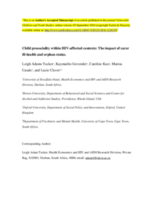This study focuses on the psychosocial well-being of youth affected by HIV and AIDS. The study used a cross-sectional household survey on 2477 child-carer pairs in a community that was HIV endemic within the province of KwaZulu-Natal, South Africa. In particular, this survey focuses on a sub-set of 2136 child carer pairs. Child pro-sociality was evaluated using the Prosocial Scale of the Strengths and Difficulties Questionnaire. Households where carers were ill with opportunistic infections had the highest discrepancies with carer reporting the child with low prosociality and the child reporting high prosociality.
The researchers hypothesized that respondents would report higher prosociality to children living in households affected by HIV. They also hypothesized that children would report higher prosociality than their carers. They assumed that “a ‘strengths and assets’ approach focused on prosociality may draw attention to seemingly neglected pathways for support and well-being.”
Through random sampling, interviewers approached each house within the sampling area to determine eligibility for participation. The original research instrument focused on general demographic data. Eligible research used the Strengths and Difficulties Questionnaire (SDQ). The SDQ is a 25-item screening tool for child and adolescent behavior. Data was analyzed using SPSS. Many of the cases were ill carers taking care of non-orphaned children (19.6%). These cases were followed by non-ill carers attending to orphaned children due to other reasons (9.9%). The smallest number of carers were ill-carers attending to children who were orphaned due to HIV/AIDS.
Across HIV-Affected diads, children’s prosocial self-reports were consistently higher than the carers’ reports. Results suggested that economics and child orphanhood due to AIDS were significant factors in distinguishing carers reports of child prosociality. Ill carers were more likely to report higher prosociality. These findings support previous literature stating that financial stressors may hamper the warmth and expressiveness generated in carer-child relationships.

